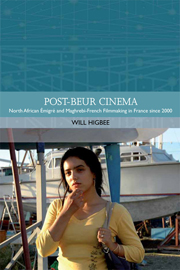Book contents
- Frontmatter
- Contents
- Acknowledgements
- List of Illustrations
- Traditions in World Cinema
- 1 Introduction: From Immigrant Cinema to National Cinema
- 2 The (Maghrebi-)French Connection: Diaspora goes Mainstream
- 3 Colonial Fracture and the Counter-Heritage Film
- 4 Of Spaces and Difference in the Films of Abdellatif Kechiche
- 5 Home, Displacement and the Myth of Return: Journey Narratives in the 2000s
- 6 Screening Islam: cinematic Representations of the Muslim Community in France in the 2000s
- 7 Conclusion: Post-Beur Cinema
- Bibliography
- Index
2 - The (Maghrebi-)French Connection: Diaspora goes Mainstream
Published online by Cambridge University Press: 05 October 2013
- Frontmatter
- Contents
- Acknowledgements
- List of Illustrations
- Traditions in World Cinema
- 1 Introduction: From Immigrant Cinema to National Cinema
- 2 The (Maghrebi-)French Connection: Diaspora goes Mainstream
- 3 Colonial Fracture and the Counter-Heritage Film
- 4 Of Spaces and Difference in the Films of Abdellatif Kechiche
- 5 Home, Displacement and the Myth of Return: Journey Narratives in the 2000s
- 6 Screening Islam: cinematic Representations of the Muslim Community in France in the 2000s
- 7 Conclusion: Post-Beur Cinema
- Bibliography
- Index
Summary
In many respects, and with few notable exceptions, Maghrebi-French and North African émigré filmmaking in France during the 1980s and 1990s has been characterised in both critical and academic discourse by notions of peripheral and auteur-led modes of production and limited exposure to niche audiences, not to mention struggles relating to funding, distribution and exhibition (Bluher 2001). The films have often been treated by academics and critics as a kind of socio-cultural document, rather than an entertainment ‘product’ aimed at mass audiences: a cinema more of interest to sociologists, journalists and academics as a reflection of contemporary socio-political realities facing North African immigrants and their French-born descendants than to producers in search of popular box-office success. This conception has been further endorsed by a broader scholarly analysis of diasporic, exilic or postcolonial filmmaking in the West over the past decade focusing on interstitial, experimental, marginal or hybrid cinema (Naficy 2001; Marks 2000; Berghahn and Sternberg 2010).
Of course, the image that has emerged of Maghrebi-French and North African émigré filmmaking of the 1980s and 1990s in academic and critical discourse is grounded in the very real difficulties that many of these filmmakers have experienced in securing funding as well as adequate distribution for their work – a fact that has restricted audiences for and thwarted the wider ambitions of a number of these filmmakers.
- Type
- Chapter
- Information
- Post-beur CinemaNorth African Émigré and Maghrebi-French Filmmaking in France since 2000, pp. 26 - 60Publisher: Edinburgh University PressPrint publication year: 2013



